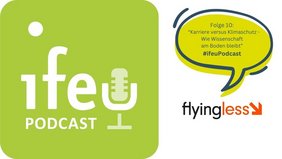FlyingLess in the ifeu podcast: "Career versus climate protection"
As part of the FlyingLess project, which is funded by the National Climate Initiative of the Federal Ministry for Economic Affairs and Climate Protection, the two sustainability experts and their project team conducted interviews with researchers, among other things, to determine job requirements profiles and motivations. Based on the findings, the FlyingLess team then developed measures to reduce flying in the scientific community.
The dilemma: career versus climate protection "The dilemma is internationalization versus climate protection," comments Nicole Aeschbach. "Top-level research is internationally networked and personal exchange is very important." For young researchers in particular, air travel to international conferences is often essential in order to establish a network and position themselves in the scientific community. This is probably no longer true to the same extent for researchers in senior positions. At the same time, however, they are currently the top emitters in the scientific community: researchers in senior positions such as senior scientists and professors currently fly around four times as often as researchers without a scientific leadership function.
Air travel is unevenly distributed Aeschbach and Görlinger explain how air travel can be reduced overall in workshops, lectures and free materials. They make these available to research institutions on their project website www.flyingless.de. "We have set up a website with information, factsheets and best practices. Among other things, we have also developed a greenhouse gas monitoring system for business trips," explains Susann Görlinger. Around 25 research institutions are already making intensive use of the services and developing measures. One university, for example, recently introduced an internalCO2 tax. "As far as specific measures are concerned, you can get creative," says Susann Görlinger. "The important thing is that we need a 60-70% reduction in air travel. Otherwise we won't be able to achieve the climate targets."
You can listen to and subscribe to ifeu Update - the podcast from environmental research on the ifeu website, Spotify, Google and Apple Podcasts and on YouTube. The podcast is produced by Nora Lessing for the Berlin agency Ahnen&Enkel, which specializes in environmental and energy issues.
